Testimonials
Since its launch in 2015, more than 70 scholars and practitioners have developed content for #dariahTeach. From translating existing courses, to developing case studies, and contributing videos. Many other academics have used #dariahTeach in the classroom Learn more about the experiences users and contributors have with #dariahTeach.
Marjorie Burghart

The #dariahTeach platform offers many opportunities: lifting the barriers, the boundaries of time and distance for instance.
Thanks to the platform, I have been able to make the best of the digital resources I have developed. I used them in several
Summer schools following the "reversed classroom" principle, where students study the online course before meeting with teachers
for hands-on sessions where they put the knowledge into practice and get feedback. During the first lockdown in Spring 2020,
I also used the resources to organise a massive online course, with more than 200 students distributed in 3 language groups.
Now I have integrated the resources into my regular teaching, at graduate and post-graduate level.”
- Marjorie Burghart, Researcher at the French National Centre for Scientific Research
- Marjorie Burghart, Researcher at the French National Centre for Scientific Research
Amelia del Rosario Sanz Cabrerizo
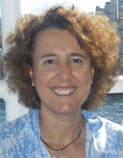
“The students in the Master´s Program in Digital Humanities at the Complutense University of Madrid (Master en Letras Digitales) have the
pleasure of contributing their translations of three DARIAH-TEACH courses: Introducción a las Humanidades Digitales, Alfabetizaciones
multimedia, and La codificación textual y la iniciativa TEI back to the #dariahTeach platform. We developed this optional activity
within the framework of three subjects. It complements our teaching program and is a promising way to learn by sharing knowledge and
competences with the huge Spanish community.
Students chose the #dariahTeach course to translate. They then formed a team, with a leader to manage the project and two teachers as counsellors. A schedule and methodology were designed that included different steps and tasks. All materials were shared by the team in a Moodle space on Google Drive. Translations were iteratively reviewed by the team and the teachers. Images and texts were localized by the students. For example, they recorded texts in Spanish, made searches for pan-hispanic comic figures such as El Zorro, and then introduced examples of literary Spanish. Certain difficulties arose concerning the terminology and video transcriptions, which made it a greater time investment than expected. We hope our translations will be helpful for other students and teachers, and that they will be able to use them to feel more empowered.”
- Amelia del Rosario Sanz Cabrerizo, Professor at the Department of French Studies at the Universidad Complutense de Madrid
Students chose the #dariahTeach course to translate. They then formed a team, with a leader to manage the project and two teachers as counsellors. A schedule and methodology were designed that included different steps and tasks. All materials were shared by the team in a Moodle space on Google Drive. Translations were iteratively reviewed by the team and the teachers. Images and texts were localized by the students. For example, they recorded texts in Spanish, made searches for pan-hispanic comic figures such as El Zorro, and then introduced examples of literary Spanish. Certain difficulties arose concerning the terminology and video transcriptions, which made it a greater time investment than expected. We hope our translations will be helpful for other students and teachers, and that they will be able to use them to feel more empowered.”
- Amelia del Rosario Sanz Cabrerizo, Professor at the Department of French Studies at the Universidad Complutense de Madrid
Esther Aminata Kamara
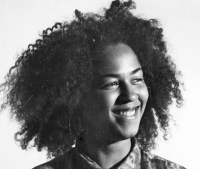
“I worked with #dariahTeach in two ways. First, I took several courses as part of my MA Media Studies: Digital Cultures at Maastricht University.
I appreciated the asynchronous learning and the multimodality that the platform offered. It was helpful to be able to watch videos from
professors that easily. The difference with say, a platform like YouTube, is that you miss out on the surrounding context. On #dariahTeach,
you had video, text, images, hyperlinks, all working together to enhance learning.
I also worked with #dariahTeach as a contributor. I created the case study 'Digital Orality', which I also presented during the IGNITE Digital Roundtables 2020. As a developer I learned how to make multimodal content work together, and how to structure learnings in a pace that makes sense for the participants. It is similar to explicating your own learning and brainstorming process; what sources did I use, what videos inspired me, what images are relevant. That way I could learn how to make content more engaging as well.”
- Esther Aminata Kamara, Student Assistant IGNITE and #dariahTeach, freelance writer and researcher.
I also worked with #dariahTeach as a contributor. I created the case study 'Digital Orality', which I also presented during the IGNITE Digital Roundtables 2020. As a developer I learned how to make multimodal content work together, and how to structure learnings in a pace that makes sense for the participants. It is similar to explicating your own learning and brainstorming process; what sources did I use, what videos inspired me, what images are relevant. That way I could learn how to make content more engaging as well.”
- Esther Aminata Kamara, Student Assistant IGNITE and #dariahTeach, freelance writer and researcher.
Costas Papadopoulos
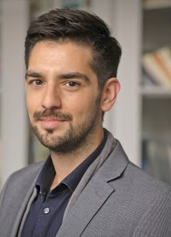
“I have been teaching 3D for over a decade both in a classroom setting but also in the form of workshops in conferences and
outreach events. However, teaching 3D technologies involves processes that are very time consuming and most often the allocated
time is not adequate to cover all the learning material. Therefore, I decided to use #dariahTeach, a platform with Open Educational
Resources to create a course that could work for both my students as well as lone learners. I wanted to provide learners the opportunity
to go through the material at their own pace, and also offer the moment of reflection by incorporating quizzes and exercises that deal
with both the methodological and the theoretical dimension of 3D visualisation. For my students, the course ‘Remaking Material Culture
in 3D’ worked well as a flipped classroom material, therefore spending class time more creatively, looking at particular case studies,
reflecting on processes and products, and discussing methodological or technical bottlenecks. Without this material accessible online,
most of my class time would have been spent on very technical aspects of 3D visualisation, therefore, turning the class into a series
of skills sessions without moments to reflect on 3D as a modality of knowledge production.”
- Costas Papadopoulos, Assistant Professor in Digital Humanities and Cultures Studies at Maastricht University
- Costas Papadopoulos, Assistant Professor in Digital Humanities and Cultures Studies at Maastricht University
Claartje Rasterhoff
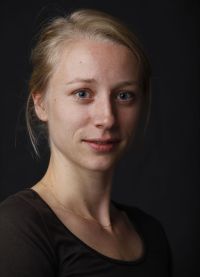
“Last year, I used #dariahTeach for the first time in the MA Media Studies: Digital Cultures at Maastricht University.
The materials in the #dariahTeach module Design Thinking and Maker Culture formed the backbone for the similarly titled course.
Integrating the module in our MA course worked out very well. First of all, this #dariahTeach module puts the topic of user-centred
design into practice. It has been designed specifically for and with MA students and this clearly shows in the scope, depth ,
and tone of voice of the learning materials.
Second, the teaching module is not prescriptive. Its modular structure with different units provides resources and inspiration, opening up rather than limiting potential use and applications of content. In our 8-week course, students were going through a full design thinking lifecycle in creating their own group project and a series of interlinked blog posts on the same topic. The #dariahTeach module acted as a constant and as a framework for students to go back to and did not interfere with or dictate their research process. Student feedback indicates that they learned as they were designing and making, and that the non-linear and multimodal structure of the module facilitated such self-directed and iterative learning processes.
Finally, I taught the course in the midst of the pandemic, in hybrid as well as fully online teaching contexts. Using #dariahTeach in project-based groupwork made the boundaries between learning and other activities in students’ lives more fluid, and provided opportunities to create, connect, and play in a time where there are few alternatives. “
- Claartje Rasterhoff, Assistant Professor in Cultural Policies and Management at Maastricht University
Second, the teaching module is not prescriptive. Its modular structure with different units provides resources and inspiration, opening up rather than limiting potential use and applications of content. In our 8-week course, students were going through a full design thinking lifecycle in creating their own group project and a series of interlinked blog posts on the same topic. The #dariahTeach module acted as a constant and as a framework for students to go back to and did not interfere with or dictate their research process. Student feedback indicates that they learned as they were designing and making, and that the non-linear and multimodal structure of the module facilitated such self-directed and iterative learning processes.
Finally, I taught the course in the midst of the pandemic, in hybrid as well as fully online teaching contexts. Using #dariahTeach in project-based groupwork made the boundaries between learning and other activities in students’ lives more fluid, and provided opportunities to create, connect, and play in a time where there are few alternatives. “
- Claartje Rasterhoff, Assistant Professor in Cultural Policies and Management at Maastricht University
Almási Zsolt
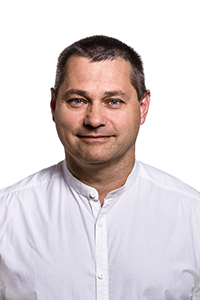
“When having learned about the concept of dariahTeach I immediately found it intriguing and thought-provoking, i.e.
creating courses that are not built according to the principles of MOOCs, like Coursera or Udemy in that #dariahTeach courses are
content and skills-based and completing them is not limited by deadlines. The learning process thus is the responsibility of the
student without external force.
First, I completed a dariahTeach course and found it so fascinating that I use some of the material (tweaked for my purposes) found there in my own teaching as well. Besides completing a course, I registered for building a course which aims at teaching the ins-and-outs of building an online exhibition. The building of course has not been finished yet, but is very close to completion.”
- Almási Zsolt, Associate Professor, Head of the Department of English Literatures and Cultures, Péter Pázmány Catholic University
First, I completed a dariahTeach course and found it so fascinating that I use some of the material (tweaked for my purposes) found there in my own teaching as well. Besides completing a course, I registered for building a course which aims at teaching the ins-and-outs of building an online exhibition. The building of course has not been finished yet, but is very close to completion.”
- Almási Zsolt, Associate Professor, Head of the Department of English Literatures and Cultures, Péter Pázmány Catholic University
Palia Pandit
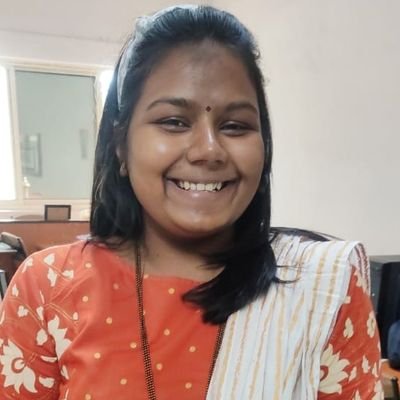
“As a novice in Design Thinking, I, along with two of my colleagues participated in the IGNITE Roundtable Conference, which was held online
owing to the lockdown in April 2020. Through IGNITE, I was introduced to the #dariahTeach platform, which offers OER for
Digital Arts & Humanities. Being a research scholar in Digital Humanities and a teacher in higher education in India, the course
“Introduction to Design Thinking & Maker Culture” broadened the definition of my research problem, and I could include it in my
doctoral thesis as an area that I look forward to exploring.
Digital Humanities is an emerging field in India, and therefore such OER that #dariahTeach offer are immensely helpful to research scholars like me, especially in the present conditions of restricted travel and minimal social contact. I look forward to delving deeper into the materials provided on this platform for further research and to promote more engaging learning experiences in higher education. ”
- Palia Pandit, Assistant Professor in English at Dempo Charities Trust Dhempe College of Arts & Science Miramar
Digital Humanities is an emerging field in India, and therefore such OER that #dariahTeach offer are immensely helpful to research scholars like me, especially in the present conditions of restricted travel and minimal social contact. I look forward to delving deeper into the materials provided on this platform for further research and to promote more engaging learning experiences in higher education. ”
- Palia Pandit, Assistant Professor in English at Dempo Charities Trust Dhempe College of Arts & Science Miramar
Stephanie Ochiel
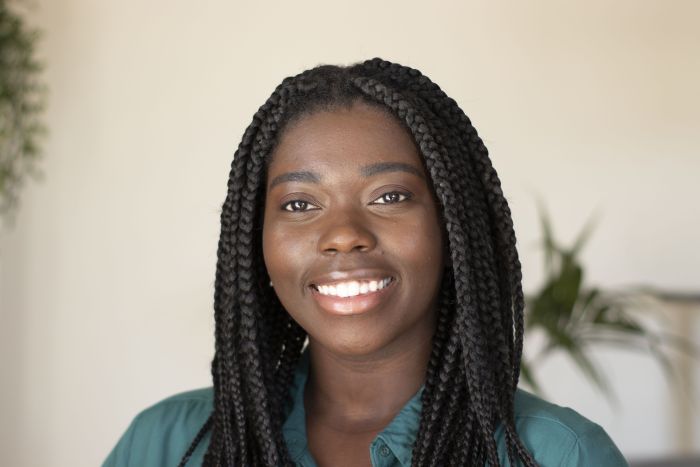
“I used #dariahTeach for both my studies and afterwards as a developer. During my MA Media Studies: Digital Cultures programme
at Maastricht University, we used the platform to supplement the teaching of some of our courses. It was interesting and exciting
to see how the multimodal aspect of the platform could enhance our learning, especially with the interactive quizzes and exercises
that allowed me to interact with the content and fully grasp the context of our subject topics.
As a developer, I was essentially on the other side of the platform. This helped me to really understand the needs of the students and how important it was that the multimodal aspects (such as audio clips, YouTube videos and exercises) fit and aided the surrounding written content. I also was able to witness this personally during the IGNITE Autumn School, where participants used that content that I helped create and edit. It was really insightful and great to be a part of this. ”
- Stephanie Ochiel, Student Assistant Maastricht University
As a developer, I was essentially on the other side of the platform. This helped me to really understand the needs of the students and how important it was that the multimodal aspects (such as audio clips, YouTube videos and exercises) fit and aided the surrounding written content. I also was able to witness this personally during the IGNITE Autumn School, where participants used that content that I helped create and edit. It was really insightful and great to be a part of this. ”
- Stephanie Ochiel, Student Assistant Maastricht University

